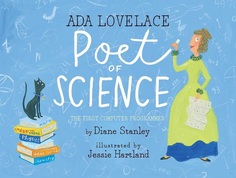
Let’s start with books about Ada herself; it’s quite possible to become obsessed with the ever-growing body of biographies, informational books, and fictional works relating to her. (Just ask my friends.) In the picture book category, we have Diane Stanley and Jessie Hartland’s just-released (October 4) Ada Lovelace, Poet of Science: The First Computer Programmer, as well as Ada Byron Lovelace and the Thinking Machine, by Laurie Wallmark and April Chu. At the higher end, my favorite is Ada’s Algorithm: How Lord Byron’s Daughter Ada Lovelace Launched the Digital Age, by James Essinger. (You can read book talks for the last two books mentioned on my blog, www.hhpcommunities.com/youngadultlit.)
Ada’s mother provided her with a rigorous mathematics and science education in an effort to curb a dangerous trait inherited from her father—imagination. What would she think of the directions in which present-day authors have taken Ada’s story! Jordan Stratford has a fictional series called The Wollstonecraft Detective Agency, starring Ada and her contemporary Mary Shelley. Sydney Padua offers the graphic novel The Thrilling Adventures of Lovelace and Babbage: The (Mostly) True Story of the First Computer. It’s a wild ride through an alternate history.
Two novels, John Green’s An Abundance of Katherines and Gretchen McNeil’s I’m Not Your Manic Pixie Dream Girl, feature protagonists who strive to create algorithms that will change their social lives. Carlos Bueno blends fiction and nonfiction in Lauren Ipsum: A Story about Computer Science and Other Improbable Things. There are many resources for learning about coding, including Technology: Cool Women who Code, by Andi Diehn and Lena Chandhok; and Awesome Algorithms and Creative Coding, by Clive Gifford. There are books showing how coding has impacted history, such as The Imitation Game: Alan Turing Decoded, by Jim Ottaviani and Leland Purvis, a biography offered in a graphic novel format. Box Brown’s Tetris: The Games People Play tells the story of computer scientist Alexey Pajitnov, creator of the video game Tetris.
We owe a great debt to Ada Byron Lovelace. I believe we are beginning to make good on that debt with the emergence of literature, some in the YA range, related to her life and to mathematics, which was her passion. And we are paying it forward as we celebrate Ada Lovelace Day on the second Tuesday of every October, encouraging our young women to appreciate the wonder that can be found in the STEM subjects and to consider a career in a field that, while generally considered inappropriate for females in Ada’s lifetime, holds great potential for all the young people in our present learning communities.



 RSS Feed
RSS Feed